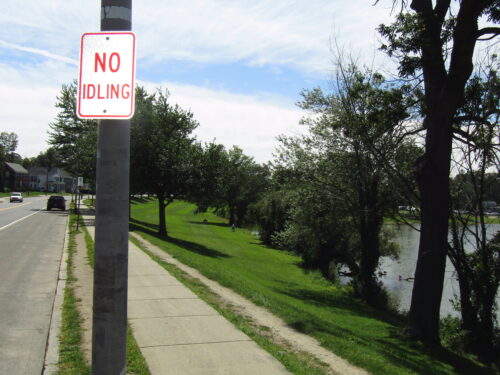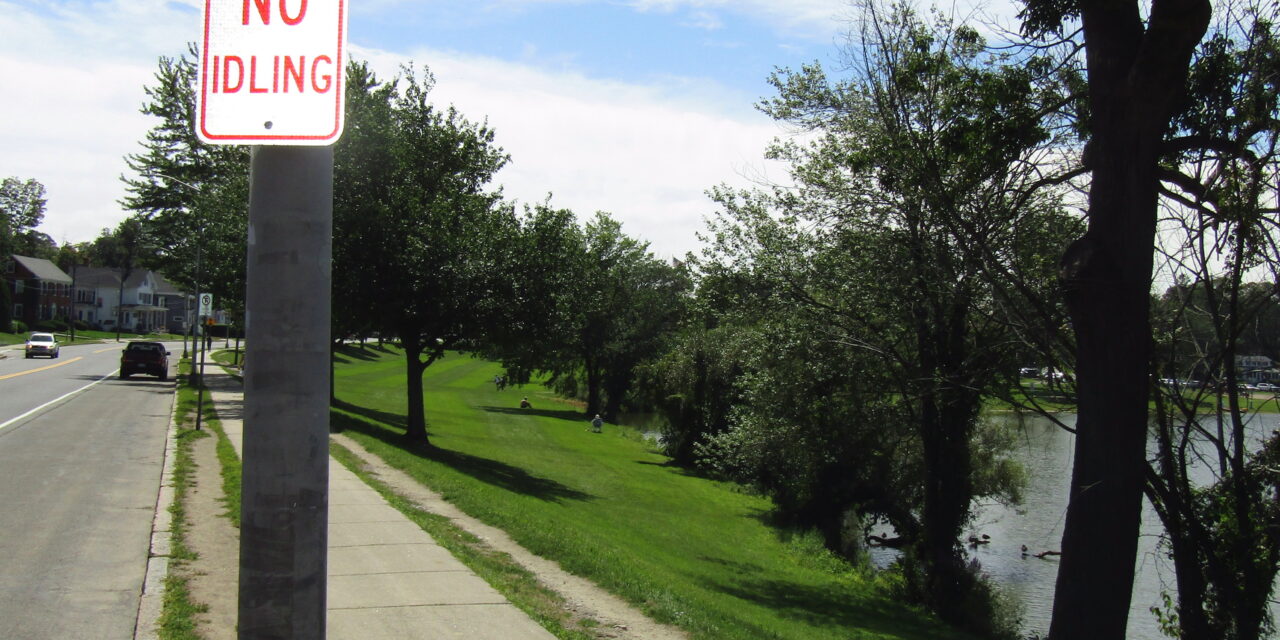
THE NO IDLING signs along Lake on Main Street will be removed after a vote of the Town Council. (Mark Sardella Photo)
By MARK SARDELLA
WAKEFIELD —— The eight “NO IDLING” signs that were recently put up on Main Street along the Lake at the direction of Town Council Chairman Jonathan Chines will now be removed after a vote of the full Town Council last night.
Several councilors, led by Michael McLane, argued that local and state regulations dictate that all such traffic and road signage should be approved by the full board, not unilaterally by the chairman of the Town Council and/or the Town Administrator.
McLane said that he recently noticed the signs along the Lake, intended to prevent drivers from sitting in their cars with the engine running. He asked Town Administrator Stephen P. Maio about them and was told that Chines had requested them. McLane said that he was “a bit chagrined” that no input was sought from the police or the Traffic Advisory Committee regarding the signs.
But McLane said that his main concern was with respect to the “process.” He cited the Town Charter and Massachusetts regulations, which state that the authority for the placement of all signs rests with the full Town Council.
He further noted that state law only prohibits idling for longer than five minutes. Thus, he pointed out, the signs along the Lake, which simply read “NO IDLING,” do not reflect state law.
McLane also noted that there are many places in town where cars idle. He said that he found it curious that the only place where the signs went up was along a stretch of Main Street that was the subject of a contentious discussion recently. (That discussion concerned the removal of all parking along the Lake in favor of bike lanes.)
“I don’t think idling is a huge problem,” McLane added, calling the signs “unnecessary and unpleasing.”
Maio admitted that the signs probably should have gone through the full board but noted that in recent years some “non-regulatory” signs have not come before the Town Council.
Chines admitted that he made the request in the context of the recent discussion of a proposed bike and pedestrian path along the Lake. He said that in his observation, about 20 percent of the cars parked along the Lake on Main Street have their engines running. He said that he made the request because the Lake is an ecologically sensitive area. He insisted that it was not his intention to shortcut any process.
Councilor Robert Vincent cited several sections of the Town Charter and noted that at no time has the full Town Council delegated away its authority over signage.
Vincent noted that the only place that state law mandates “NO IDLING” signs is around schools. But in Wakefield, he noted, the only school that has them is the Galvin Middle School – and those signs don’t conform to state law in terms of what they say.
Board members should check all applicable regulations before asking the Town Administrator to do something, Vincent insisted. He pointed out that the local bylaw provision that gives the Town Council the authority over signage decisions dates back to 1961.
“At any time, the board could have delegated or changed that, but it didn’t” he said.
Town Councilor Edward Dombroski said that he also found the timing of the “NO IDLING” signs curious in light of recent discussions over plans for that stretch of Main Street.
He noted that there is more than one kind of pollution and maintained that “sign pollution” was one that mattered a lot around the Lake.
Anne Danehy agreed that the “NO IDLING” signs and all sign requests should come before the full Town Council. It is important for transparency, she argued, and most sign approvals take very little of the board’s time.
Councilor Julie Smith-Galvin disagreed, saying that she thought that putting up the “NO IDLING” signs without the full board’s approval was “innocent,” adding that she has often thought that “NO IDLING” signs were needed along the Lake.
“I didn’t become a Town Councilor to vote on every single sign that goes up in town,” she said.
Councilor Mehreen Butt agreed, adding that she didn’t feel the need to vote on every sign.
McLane rebutted Chines’ claim that 20 percent of the cars parked along the Lake have their engines running, insisting it was more like one in 20.
“I will never go to Steve (Maio) as an individual Town Councilor and say ‘I want X,’” McLane said. “I wish none of us would.”
Chines attempted to downplay his role in directing the “NO IDLING” signs to be put up along the Lake, claiming it was “an off-hand request, not an order.”
Ultimately, the Town Council overrode Chines’ unilateral action, voting 5-1 to have the signs removed immediately. Voting in favor of removing the signs were Councilors Vincent, Dahehy, McLane, Butt and Dombroski. The lone “No” vote was cast by Councilor Julie Smith-Galvin. Chines abstained.





